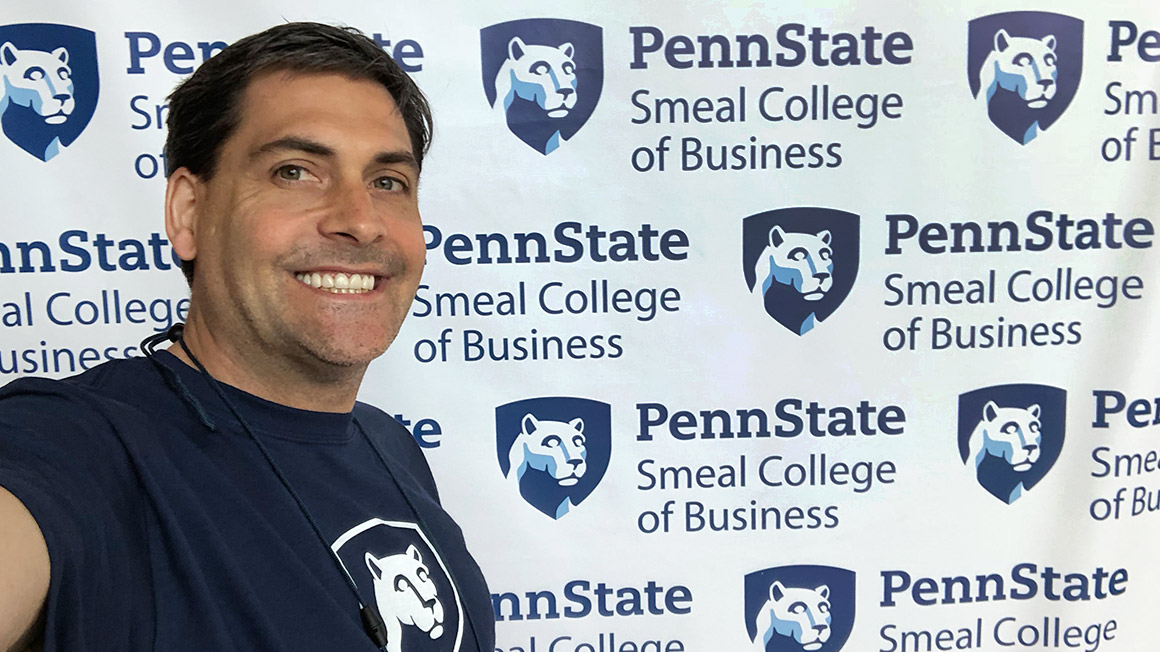UNIVERSITY PARK, Pa. — For most of Robert Bussey’s life, school wasn’t something that really worked for him. Before earning his bachelor’s degree through Penn State World Campus in 2017 and then enrolling in the Penn State Online MBA program, he had enrolled in — and dropped out of — three other schools.
“I really wasn’t able to put together a coherent strategy for success,” said Bussey. “I had many majors — film, finance, information systems — and never really found my niche.”
He joined the U.S. Marine Corps, spent four years in active duty traveling around the world, and then worked to build his career in cybersecurity. But when he interviewed for his dream job working at MIT Lincoln Laboratory, he was stopped in his path.
“I was sitting across from the guy at my third interview there, and he said, ‘Well, you’ve got all the qualifications, but it’s really hard with you not having a degree.’ So at that point, sitting across from him, I said, ‘I’m going back.’”
Bussey was encouraged by his wife, Luisa, whom he married in 2016, gaining two stepdaughters in the process. That year, he also bought a house and, to top it all off, went back to school.
“Starting was the hardest part but also the best decision I’ve made in the last five years,” he said.
Bussey, who is based in the Boston, Massachusetts, area, was looking for three things from his college: a great cybersecurity program, a great veteran support system, and a nontraditional learning environment. He found all three at Penn State World Campus, completing the three years’ worth of credits he needed for his bachelor’s degree in just two.
“I took a semester off and then decided to tackle an MBA,” he said. “I felt like I had the IT skills, I had the security and risk skills, but what I didn’t have was the business acumen. I thought an MBA would make me more well-rounded and valuable wherever I go.”
Once again, he was interested in a non-traditional learning environment — Penn State’s Online MBA program, led by the internationally recognized Penn State Smeal College of Business, was the right fit.
“There isn’t one template for every student,” said Bussey. “The traditional way didn’t really work for me. It was boring, and I lost interest. I needed an option where I could go to school from home at my own pace.”
And while he knew his own habits, what Bussey didn’t know was how much Penn State’s program would ignite something within him.
“I never felt like I was comfortable in the traditional cubicle working a 9-to-5 day, but I didn’t have the confidence or the courage or the tools to do anything about it,” he said. “What the corporate innovation and entrepreneurship (CIENT) concentration did was give me all of that.”
Bussey took what he was learning and put it into action, leaving his job and starting his own cybersecurity consulting firm. But that, he said, was well within his wheelhouse. He wanted to do something outside of his comfort zone as well, and soon he got the opportunity.
In addition to the typical business administration classes offered through the MBA program, the CIENT concentration includes courses like ENTR 502: Business Modeling and New Venture Creation, which was one of Bussey’s favorite — and most formative — courses.
“We built a company from scratch,” he said. “We’re all wearing lab coats; we don’t know if what we’re doing is going to work. You get to test, like in a lab. You try something — did it work? No, try something else. You just keep doing that, and that’s what entrepreneurship is all about.”
That’s exactly why Jeanette Miller, associate director of Smeal’s Farrell Center for Corporate Innovation and Entrepreneurship, designed the course the way she did.
“I don’t want to teach theory,” she said. “I want to create an environment where the students actually test ideas and go through the process.”
But in designing the course, which takes students through all the steps of creating a business — from the initial idea to the final pitching process — Miller said, she did not anticipate that four of the 17 groups would create actual companies. Bussey and his team were one of those, taking Safe Ops Systems Inc. (SOS), a drone-technology platform company, from concept to creation.
“As an educator, you can tell the ones that are really engaged and in it to learn something,” Miller said. “I could tell with SOS that they were going above and beyond.”
“We are looking to bring innovation to help police and fire deal with incidents, provide situational awareness, rapid response and live intelligence capabilities, using drones, dashboard cams, body cams, and sensors to public safety and utilities,” said Bussey.
Though two of the original team members have since left the company, Bussey and Sam Ajmani are pushing forward with SOS, which is currently in the funding stage. Bussey said he loves the opportunity to talk about Penn State in meetings with venture capitalists and potential investors.
“Stanford and Harvard are not the only colleges out there that are pumping out entrepreneurial students,” he said. “We have a great program with great students who can come out with viable companies. We want to put Penn State on that map as well.”
He also works to support current Penn State students through his work as an alumni mentor in the College of Information Science and Technology.
“I always believe in giving back,” he said.
Bussey has one semester left in the MBA program, but it’s just one stop on his new entrepreneurial journey.
“I wrote down my top career goals: Obtain an MBA. Become a founder of a company. Start a consulting firm. Become a C-level executive. Complete a Ph.D. Write a book. Be a mentor.”
Many of those are already checked off, but Bussey said he feels like he’s just getting started.
“Something here tapped into who I really am, an entrepreneur and innovator," he said. "I think it awakened something that was dormant inside of me.”

